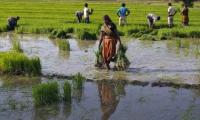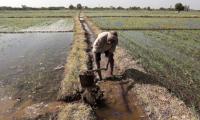Soil Health Crucial for Crop Yields: Experts
Experts warn of soil degradation due to chemical overuse and crop residue burning, emphasizing soil health preservation for improved yields and quality crops.

Illustration: Dominic Xavier/Rediff.com
Chandigarh, Sep 1 (PTI) Farmers and experts expressed concern over degradation of soil due to excessive use of chemicals and burning of crop residue and said preserving soil health is key to improve yields and produce quality crops.
A meeting-cum-interactive session was held here on Saturday to deliberate on 'soil biological health and cultivation of quality food as per international standards'.
During the session experts and other stakeholders flagged that methane is the second biggest greenhouse gas emission, which is 20 times more harmful than carbon dioxide (CO2).
According to experts, major source of methane is biomass left untreated or used as manure.
They said that the soil condition in Punjab has deteriorated, and yields are declining, leading to excessive use of chemical fertilizers.
Citing a report on soil health condition by Punjab Agriculture University, they said that with the use of NPK, efficiency has reduced to 20 per cent.
On an average, they said, use of every kilogram of NPK led to production of 80 kg grains in 1966-67, but the yields have declined to 16 kg by 2023.
NPK is referred to fertilisers made of nitrogen, phosphorus and potassium, the key nutrients that boost plant growth.
Sanjeev Nagpal, an expert in sustainable agricultural practices, and Director, Sampurn Agriventures, said, "Under the Green Revolution programme to grow more food, it was decided to introduce chemicals along with high yielding seeds with mechanized farming, but soil biology was ignored.
"Today India is surplus in food, but farmers are in a distressed condition loaded with debt. Our food is deficient in nutrition value and 50 per cent Indians are suffering from nutrition deficiency. India imports food supplements worth USD 4.5 billion."
Nagpal further said that as per recommendations, manure was to be used along with chemical fertilizers. But unfortunately, manure was defined in terms of NPK.
"Therefore, farmers stopped using manure and started using excessive chemical fertilizers. Biological health of soil must be preserved for sustainable agriculture," he added.
Stakeholders also discussed the role of compressed biogas (CBG) projects in improving soil health.
Under CBG projects clean energy is produced from bio waste.
Arvind Ahlawat of Indian Council of Agricultural Research (ICAR), New Delhi, who is head at KVK Abohar, said, under the Union government's 'Viksit Bharat' mission, an ambitious plan has been initiated to take India's agricultural exports to Rs 1 lakh crore.
"ICAR is actively promoting safe food cultivation, and CBG projects will be an important link between farmers and exporters. Viksit Bharat can be achieved only by developing agriculture integrated with global markets," he said.
Ahlawat further said that soil biological health is essential for producing quality food while maintaining yields acceptable in international markets.
"Punjab produces close to 50 million tonnes of biomass, which is either burnt or wasted. Utilizing this resource, to produce high quality fermented manure will be a good long-term policy to rejuvenate our agriculture," he added.
Navindu Gupta, Executive Director, SPS Biotech, said that soil organisms play a crucial role in maintaining soil health by breaking down organic matter, recycling nutrients, and enhancing soil structure, but the use of NPK was posing a threat to soil organisms too.
"Organic carbon is a key component of soil organic matter, serving as a primary energy source for soil organisms. It contributes to the formation of humus, which improves soil fertility, water retention, and resistance to erosion," he added.
According to Ashish Kumar, MD, Verbio, "Even when we do not manage waste and let it decay in the open, it leads to release of gases and multiplication of pests and fungus.
"Preventing paddy straw burning and processing along with other crop residues and waste into bio fertilizer prevents environment pollution and reduces the use of chemicals," Kumar said.
Harinder Singh Dhillon, a farmer, said that Punjab contributes nearly 60 per cent food grains to the central pool but in the process, "we have damaged our soil, water and air. Punjab farmers are under heavy debt due to rising cost of cultivation".
Dhillon suggested the need to adopt an integrated agri business model to shift to high value and quality crops.
"Farmers should be encouraged to undertake safe and quality food cultivation and develop farm-to-fork concept through farmers' groups for better value realization," he added.
A meeting-cum-interactive session was held here on Saturday to deliberate on 'soil biological health and cultivation of quality food as per international standards'.
During the session experts and other stakeholders flagged that methane is the second biggest greenhouse gas emission, which is 20 times more harmful than carbon dioxide (CO2).
According to experts, major source of methane is biomass left untreated or used as manure.
They said that the soil condition in Punjab has deteriorated, and yields are declining, leading to excessive use of chemical fertilizers.
Citing a report on soil health condition by Punjab Agriculture University, they said that with the use of NPK, efficiency has reduced to 20 per cent.
On an average, they said, use of every kilogram of NPK led to production of 80 kg grains in 1966-67, but the yields have declined to 16 kg by 2023.
NPK is referred to fertilisers made of nitrogen, phosphorus and potassium, the key nutrients that boost plant growth.
Sanjeev Nagpal, an expert in sustainable agricultural practices, and Director, Sampurn Agriventures, said, "Under the Green Revolution programme to grow more food, it was decided to introduce chemicals along with high yielding seeds with mechanized farming, but soil biology was ignored.
"Today India is surplus in food, but farmers are in a distressed condition loaded with debt. Our food is deficient in nutrition value and 50 per cent Indians are suffering from nutrition deficiency. India imports food supplements worth USD 4.5 billion."
Nagpal further said that as per recommendations, manure was to be used along with chemical fertilizers. But unfortunately, manure was defined in terms of NPK.
"Therefore, farmers stopped using manure and started using excessive chemical fertilizers. Biological health of soil must be preserved for sustainable agriculture," he added.
Stakeholders also discussed the role of compressed biogas (CBG) projects in improving soil health.
Under CBG projects clean energy is produced from bio waste.
Arvind Ahlawat of Indian Council of Agricultural Research (ICAR), New Delhi, who is head at KVK Abohar, said, under the Union government's 'Viksit Bharat' mission, an ambitious plan has been initiated to take India's agricultural exports to Rs 1 lakh crore.
"ICAR is actively promoting safe food cultivation, and CBG projects will be an important link between farmers and exporters. Viksit Bharat can be achieved only by developing agriculture integrated with global markets," he said.
Ahlawat further said that soil biological health is essential for producing quality food while maintaining yields acceptable in international markets.
"Punjab produces close to 50 million tonnes of biomass, which is either burnt or wasted. Utilizing this resource, to produce high quality fermented manure will be a good long-term policy to rejuvenate our agriculture," he added.
Navindu Gupta, Executive Director, SPS Biotech, said that soil organisms play a crucial role in maintaining soil health by breaking down organic matter, recycling nutrients, and enhancing soil structure, but the use of NPK was posing a threat to soil organisms too.
"Organic carbon is a key component of soil organic matter, serving as a primary energy source for soil organisms. It contributes to the formation of humus, which improves soil fertility, water retention, and resistance to erosion," he added.
According to Ashish Kumar, MD, Verbio, "Even when we do not manage waste and let it decay in the open, it leads to release of gases and multiplication of pests and fungus.
"Preventing paddy straw burning and processing along with other crop residues and waste into bio fertilizer prevents environment pollution and reduces the use of chemicals," Kumar said.
Harinder Singh Dhillon, a farmer, said that Punjab contributes nearly 60 per cent food grains to the central pool but in the process, "we have damaged our soil, water and air. Punjab farmers are under heavy debt due to rising cost of cultivation".
Dhillon suggested the need to adopt an integrated agri business model to shift to high value and quality crops.
"Farmers should be encouraged to undertake safe and quality food cultivation and develop farm-to-fork concept through farmers' groups for better value realization," he added.
You May Like To Read
TODAY'S MOST TRADED COMPANIES
- Company Name
- Price
- Volume
- Vodafone-Idea-L
- 11.65 (+ 3.56)
- 106772451
- Alstone-Textiles
- 0.28 ( -3.45)
- 44187760
- Mangalam-Industrial
- 0.88 ( -2.22)
- 39177573
- Sunshine-Capital
- 0.27 (+ 3.85)
- 35956340
- GMR-Airports
- 104.40 (+ 6.37)
- 30453005





